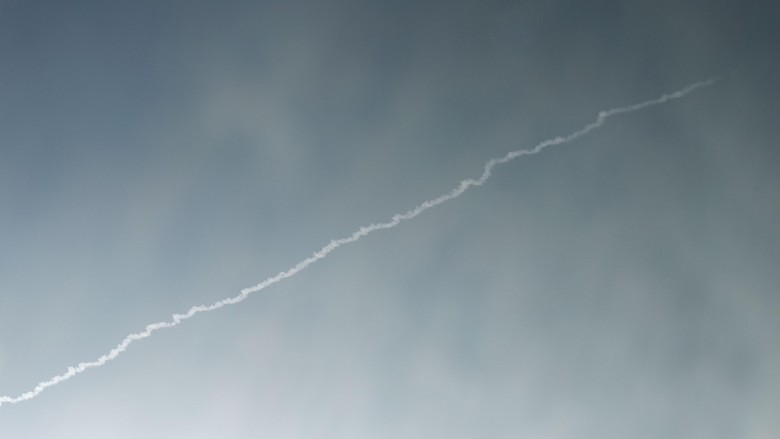Missile launch by N. Korea met with tepid response, again
By CNS News | February 8, 2016, 13:11 EST
 An unidentified object is photographed in the sky from Dandong, China, near the North Korean border Sunday at the same time a North Korea rocket was launched. (Minoru Iwasaki/Kyodo News via AP)
An unidentified object is photographed in the sky from Dandong, China, near the North Korean border Sunday at the same time a North Korea rocket was launched. (Minoru Iwasaki/Kyodo News via AP) WASHINGTON (CNSNews.com) – North Korea’s rocket launch Sunday sparked a now familiar pattern of responses to provocative actions by the Kim regime, with the U.S. leading a chorus of condemnation and calling for a “firm” U.N. Security Council response, and China signaling it wants to apply the brakes.
The launch, which Pyongyang said carried an earth observation satellite into orbit, violated a series of previous Security Council resolutions that prohibit North Korea from using ballistic missile knowhow. It was the sixth time since 1998 that the regime has tested technology which the Pentagon says aims to bring the U.S. mainland within reach of a nuclear-tipped intercontinental missile.
U.S. Secretary of State John Kerry said it was time for the Security Council to act, to hold North Korea to account “in a firm and united way.” In a statement Sunday, the Security Council condemned the rocket launching and said it was moving to quickly adopt a new resolution with tighter sanctions on the rogue nation, the Associated Press reported.
But Beijing’s reaction was to express regret, and then effectively call for restraint.
“The Chinese side hopes that relevant parties could react with calm and caution, refrain from taking actions that may further escalate tensions on the Korean peninsula, and jointly uphold regional peace and stability,” said Hua Chunying, China’s foreign ministry spokeswoman.
“The Chinese side always maintains that dialogue and consultation is the only way to ensure lasting peace and stability in the region,” she added. “All parties should resume contacts and talks as soon as possible and avoid further worsening the situation on the peninsula.”
Hua’s statement was silent on the need for further Security Council action against Pyongyang. China’s U.N. ambassador, Liu Jieyi, made clear that unprecedented sanctions aren’t Beijing’s priority, AP reported.
The news service cited Liu as saying that a new resolution should “do the work of reducing tension, of working toward denuclearization (of the Korean peninsula), of maintaining peace and stability, and of encouraging a negotiated solution.”
China is North Korea’s closest ally and has been defending it for the decades at the U.N., where China wields veto power as a permanent Security Council member.
Sunday’s launch came one month to the day since Kerry told his Chinese counterpart Foreign Minister Wang Yi in a phone conversation “we cannot continue business as usual” in the face of North Korean provocations.
Kerry was speaking two days after North Korea carried out a nuclear test, its fourth since 2006. Over the month since the Jan. 6 test, the UNSC has discussed the need to take “significant measures” – as it had pledged to do in a 2013 resolution that warned against a fourth test.
Those month-long discussions have yet to produce a new resolution, due again to China’s resistance.
Kerry visited China late last month to deliver his no “business as usual” message, but differences between Washington and Beijing over how to deal with the reclusive Stalinist state were evident.
Speaking alongside Kerry, Wang said China’s policy towards North Korea “will not be swayed by specific events or the temporary mood of the moment,” and stressed that sanctions are “not an end in themselves.”
Now, with Sunday’s new provocation, the UNSC held another “emergency” meeting on Sunday to discuss the launch.
The ambassador of Venezuela, which holds the rotating presidency, told reporters afterwards that the council members “strongly condemn this launch.”
“The members of the Security Council underscore this launch as well as any other DPRK launch that use ballistic missile technology, even if characterized as a satellite launch or a space launch vehicle, contribute to the DPRK’s nuclear weapon delivery system and is a serious violation of the Security Council resolutions,” said the ambassador, Rafael Ramirez, using the acronym for the Democratic People’s Republic of Korea, North Korea’s formal name.
He recalled earlier commitments to impose “significant measures” and said as a result of the latest action the UNSC would adopt a new resolution “expeditiously.”
National Security Advisor Susan Rice called the launch “yet another destabilizing and provocative action” and “a flagrant violation of multiple United Nations Security Council resolutions.”
“The United States is fully committed to the security of our allies in the region, and we will take all necessary steps to defend ourselves and our allies and respond to North Korean provocations,” she said. “We call upon the international community to stand together and demonstrate to North Korea that its reckless actions must have serious consequences.”
Kerry spoke by phone to his South Korean and Japanese counterparts, and reaffirmed to Yun Byung-se and Fumio Kishida America’s “ironclad commitment to the security and defense of Japan, the Republic of Korea, and our other allies” in the face of North Korea’s actions.
House Foreign Affairs Committee chairman Rep. Ed Royce (R-Calif.) said Sunday pending legislation to strengthen U.S. sanctions against Pyongyang must move ahead.
“As North Korea works to build a nuclear arsenal capable of hitting the United States it is clear the Obama administration’s policy of ‘strategic patience’ has failed,” he said.
The House of Representatives passed Royce’s North Korea
Sanctions Enforcement Act on Jan. 12 in a 418-2 vote (The “no” votes came from Republicans Rep. Justin Amash of Michigan and Rep. Thomas Massie of Kentucky.)
On Jan. 28, the Senate Foreign Relations Committee passed its version of the legislation, co-authored by Sens. Cory Gardiner (R-Colo.) and Robert Menendez (D-N.J.). It is scheduled for a full Senate vote next week.
Menendez said at the time enactment of the legislation “would represent the most meaningful and comprehensive response toward addressing the threat that North Korea presents to our national security interests and the security interests of our friends and allies.”
“North Korea’s latest act of belligerence is further evidence that we must act to counter the Forgotten Maniac,” Gardiner said on Sunday, in reference to Kim Jong-un.
“We must act swiftly to reverse the president’s policy of ‘strategic patience,’ and pursue mandatory sanctions aimed at changing North Korea’s pattern of illicit behavior and peacefully disarming the regime.”
Among provisions tightening restrictions on doing business with North Korea, the Senate bill requires the administration to develop and report on strategies to enhance enforcement of multilateral sanctions, to combat the regime’s cyber activities, and to promote and encourage international engagement on human rights-related issues.
Written by Patrick Goodenough











